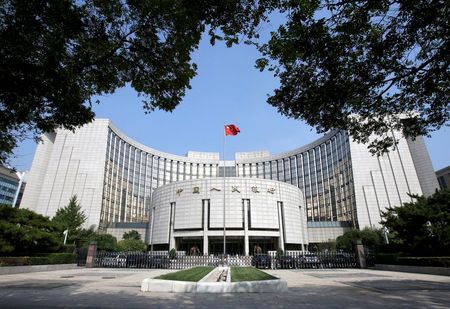SHANGHAI (Reuters) – China’s surprise decision to lower the reserve requirements for its banks last week is leading some market analysts to speculate that a cut in country’s benchmark loan prime rate may be next, possibly as early as next week.
The People’s Bank of China (PBOC) announced the cut in the amount of cash that banks must hold as reserves on Friday, releasing around 1 trillion yuan ($154.43 billion), more than expected. It is effective from July 15.
While the majority of market participants believe the RRR cut was meant to stabilise the funding needs of banks and lower their costs to support credit growth, others think a cut in major policy rates would complement this new dovish tilt.
The PBOC is likely to deliver another 50-basis point cut in the RRR in the fourth quarter, as the pressure on the economy persists while consumer inflation eases, according to the latest Reuters poll published on Tuesday.
Below are some comments from analysts and economists on the outlook for the loan prime rate (LPR) and the medium term lending (MLF) facility rate. The PBOC is expected to make an announcement on maturing MLF loans on Thursday, while the next LPR setting will be on July 20:
QU QING, CHIEF ECONOMIST, JIANGHAI SECURITIES, BEIJING
“Lowering RRR is one of government’s regulatory tools, and its aim is to reduce corporate financing costs. The market’s focus now is if the LPR would also be lowered.”
“If the LPR is lowered this month, the possibility of a subsequent cut in the medium-term lending facility (MLF) rate will be smaller. If the LPR is unchanged following the RRR cut this month, the MLF rate is likely to be lowered in the future to guide the reduction of LPR.”
“Overall, since the appeal for reducing financing costs has not changed, and it has become even more urgent, the chances of introducing various tools will not be ruled out in the future.”
MING MING, HEAD OF FIXED INCOME RESEARCH, CITIC SECURITIES, BEIJING
“The impact of a reduction in RRR and benchmark deposit rate to lower banks’ funding cost is likely to drive the LPR fixing lower.”
“Even if the MLF interest rate is not adjusted, the increase can be effectively reduced, which will form a relatively powerful push for the downward trend of LPR.”
LU TING, CHIEF ECONOMIST, NOMURA, HONG KONG
“Following this RRR cut, we believe the probability of another cut before the end of this year is not big, perhaps below 50%, and if there is another cut, most likely it will be a targeted cut, instead of a universal one. And we believe that the PBOC will rely more on its lending facilities such as the MLF, relending and rediscounting to provide long-term liquidity if necessary.
“Should the PBOC cut the MLF rate or LPR rate later in the month, it could open the door to a further rates rally. However, with our base case for no change in policy rate levels, we think the likelihood for a significant rates rally from current levels is not high and prefer to receive on bounces.”
EUGENE LEOW, RATES STRATEGIST, DBS GROUP RESEARCH, SINGAPORE
“There are a few points to note on the PBOC-Fed policy divergence. First, the Fed is likely to taper by end-2021/early 2022, whereas the PBoC has already eased.
“Second, the U.S. appears to have a higher tolerance for COVID-19 and appears more aggressive on the fiscal front. These could be more supportive of the U.S. economy at this point in the cycle. Comparatively, China has been more cautious on COVID-19 handling and more conservative on the fiscal front.
“Given this development, we now see the 1-year LPR holding steady though 2022.”
WANG YIFENG, CHIEF ANALYST, EVERBRIGHT SECURITIES, BEIJING
“The LPR and MLF are deeply anchored, and the MLF rate has played a role as the benchmark for the LPR. An RRR cut does not necessarily lead to a lowered LPR.”
“The RRR cut should save banks about 13 billion yuan in interest payments, and that translate to a less than 1 basis point in banks’ comprehensive debt cost … it is not enough to yield a downward adjustment to LPR quotation at this stage.”
ZHANG JIQIANG, CHIEF ANALYST, HUATAI SECURITIES, BEIJING
“We believe chances for a reduction in MLF and OMO rates this month are not high, but see chances for a LPR cut.”
“From a questionnaire we conducted, the majority of the investors believed that (China’s) 10-year treasury bond yields could fall to 2.8%-2.9% … And we basically agree.”
The 10-year yield is now just under 3%.
MARCO SUN, CHIEF FINANCIAL MARKETS ANALYST, MUFG BANK, SHANGHAI
“The original intention of the PBOC’s RRR cut was likely to cushion shocks on market liquidity and enterprises … And the central bank may continue to keep a balanced market liquidity, therefore we maintain our forecast that China’s LPR will not be changed this year.”
HE WEI, CHINA ECONOMIST, GAVEKAL RESEARCH, BEIJING
“The State Council’s statement does signal that policymakers could be more dovish than previously believed. Given that surprise, there is a now a possibility that the PBOC will make a small 5 bps cut in policy rates in the second half of the year.”
($1 = 6.4755 Chinese yuan)
(Reporting by Winni Zhou and Andrew Galbraith; Editing by Vidya Ranganathan and Kim Coghill)





